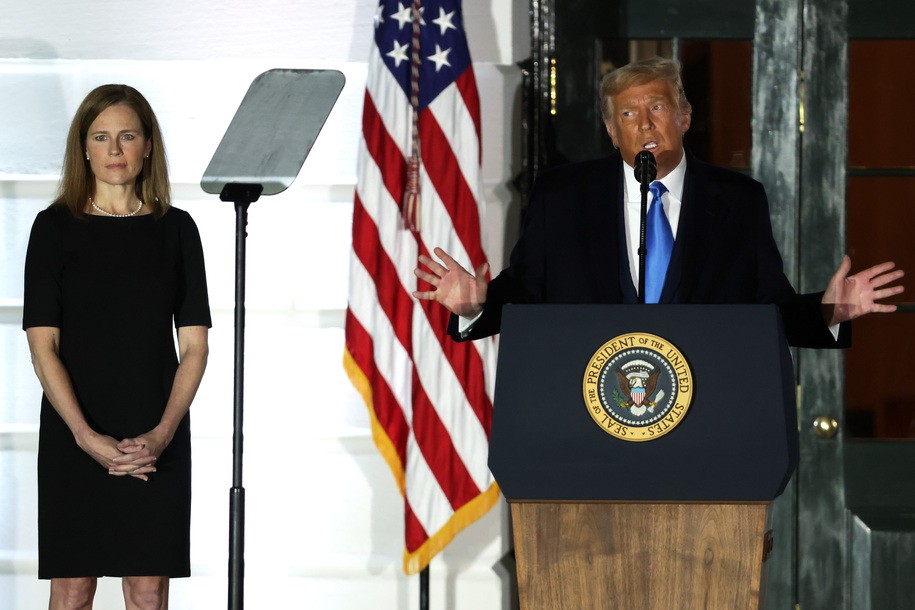
The newest member of the Supreme Court, Justice Amy Coney Barrett, is reportedly "concerned" that the American public unfairly suspects the Supreme Court to be a partisan institution.
As the Associated Press reports, we know this because Barrett said so in a speech on Sunday at the University of Louisville's McConnell Center, founded by Sen. Mitch McConnell, after being personally introduced by Mitch McConnell himself, after Mitch McConnell pushed Barrett's nomination through the Senate in a matter of weeks after the death of Justice Ruth Bader Ginsburg, after Mitch McConnell blocked a previous Supreme Court confirmation for more than a year to prevent the seat being filled by a Democratic president’s nominee.
Whether Amy Coney Barrett reflected on any of this as she awaited backstage for Mitch McConnell to finish her glowing introduction is unknown. Whether she considered even for a moment whether answering Mitch McConnell’s call to speak to McConnell backers at the McConnell Center would further fuel, in the public mind, suspicions that the Supreme Court was at this point nothing more than an extension of Republican politics with members of the judiciary working hand in hand with Republican political activists is also a mystery.
But it is highly likely that she is just f--king with us because nobody could be that obtuse unless it was on purpose. Amy Coney Barrett appears to now be just openly trolling people as she brags about the comity on the court and how, actually, justices are "hyper-vigilant" not to let "personal biases" influence their rulings no matter how much it might look like a newly emboldened partisan majority is playing Magic 8 Ball with precedent to rewrite, in some cases, a century's worth of established law.
It's possible, in Amy Coney Barrett's mind, that she actually thinks she's gracious in explaining this to us at all. It's certainly better than when Brett Kavanaugh threatened his opponents outright during his own confirmation hearings after news reporters began drilling down through a history of drunken sexual assaults that he had expected would be well and truly buried in the fashion of countless other powerful conservative operatives.
I'm meeting you halfway here, Barrett seems to be saying. I'm going to continue declaring that all of my excruciatingly predictable rulings providing near-uniform backing to Republican Party priorities are a "judicial philosophy," albeit one that seems to change its core presumptions from each case to the next as the court's conservatives Jenga their way to predetermined ideological outcomes. And you are going to sit there listening to Mitch McConnell introduce me at the Mitch McConnell Center for Republican Judicial F--kery, and it is all just an amazing coincidence.
Unfortunately for Amy Coney Barrett, if she's by some chance looking to genuinely cool public anger at the conservative court's activism, it appears she has below-zero skill at doing such a thing. Supreme Court justices have near-uniformly insisted that inside the building, all justices get along great with each other, everybody respects each other, nobody considers anyone else to be an unqualified ideological viper or unredeemed boozehound relying on movement ideologues to craft "we can do what we want" language to be printed out and distributed as new laws of the land. In actual cases, some of the justices have been issuing dissents that come remarkably close to charging those things, after being waylaid by yet another case's upturning of prior conservative "philosophies" with new arguments that directly contradict the old ones. But it's considered rude for the public actually to notice that.
Now that we're at the point of seriously (ostensibly) pondering whether states can farm out the enforcement of new civil rights-limiting laws to private bounty hunters in order to evade constitutional prohibitions against doing those things, however, it's becoming increasingly impossible to tease out just what "philosophy" is at work here other than a general decision that Republican Party-backed ideologues will support any Republican Party-backed scheme presented, in the effort to limit American democracy, backtrack on civil rights, grant corporations extensive medical powers over whoever happens to work for them, back gun vigilantism over public safety, and so forth.
Barrett shouldn’t be asking whether the public believes the Supreme Court to be a partisan entity now. It's unquestionably a partisan entity. A Republican Senate enforced a new rule declaring that the nation's first non-white president wasn’t allowed to exercise his constitutional authority to appoint Supreme Court justices for 3/4ths of his term. A Republican Senate blocked investigation of a conservative ideologue charged with grotesque—and criminal—acts against women, during the same pro-corruption spurt that saw the same Senate immunize a Republican president against consequences for international extortion and inciting violent sedition. A Republican Senate shoved Barrett's own confirmation through a mere week before a presidential election, gleefully putting a thumb in the eye of any press rube gullible enough to believe their previous outrage over doing the same thing even in the same calendar year as an election was sincere.
The Republican Party willfully turned the Supreme Court into a "partisan" entity with every tool at its disposal. The Supreme Court is now unquestionably "partisan." No reading of the court's recent opinions can make a plausible argument to the contrary.
The question Amy Coney Barrett should be asking is not whether the public believes the court is partisan. The question is whether the public still believes the rulings of the court to be legitimate.
Can the rulings plausibly be used to construct a new body of law that is not inherently contradictory? Are rulings increasingly being used as means to force through conservative priorities the public would not otherwise stomach, while simultaneously being used to nullify laws non-conservative iterations of Congress are able to pass? Are we headed to a new patchwork of state laws in which each citizen's constitutional rights depend most substantively on which state’s borders they are within? Does the court feel even the slightest hesitation in leading the nation into a new era of violent vigilanteism with new gun rulings that declare every angry, twitching finger to be a well-regulated militia consisting of only itself?
Does the public believe the Supreme Court will stand firm if Republicans declare a future election to be invalid after the Republican candidate does not win? Or does the public believe that the Supreme Court's conservative majority would eagerly back even a fraudulent hoax undermining democracy itself if the result meshed with the personal preferences of its members?
Republican-led states are engaging in those precise preparations even now, as state after state installs new restrictions on the right to vote explicitly premised on false propaganda. On hoaxes. On Republican-backed, partisan mirages of supposed "fraud" that exists nowhere, resulting in new Jim Crow laws tamping down on votes, a push that began immediately after the Supreme Court's conservative majority removed state restrictions on doing so with the implausible and now disproven claim that the Jim Crow era had passed. New laws include means by which the Republican Party can install partisan acolytes to challenge the vote tallies of counties that vote against them.
Does the public believe the Supreme Court will stop them, or help them?
The question here is not whether the Supreme Court is now being perceived as too "partisan" by the public. At this point, large sections of the public believe the court has passed beyond partisan and is now altering, unmaking, and justifying new laws to such an extent that "partisan" no longer suffices to describe it. It appears to be an effort to undermine laws themselves rather than tolerate a decline of conservative power; are such broad actions legitimate, from the court? And what happens if the public broadly decides they are not?
No story about the Supreme Court would be complete without a portrait of the court's biggest beer lover and sexual predator (except maybe for Clarence "Pubic Hair" Thomas). Give it up ladies and gentlemen for Brett Kavanaugh!


No comments:
Post a Comment